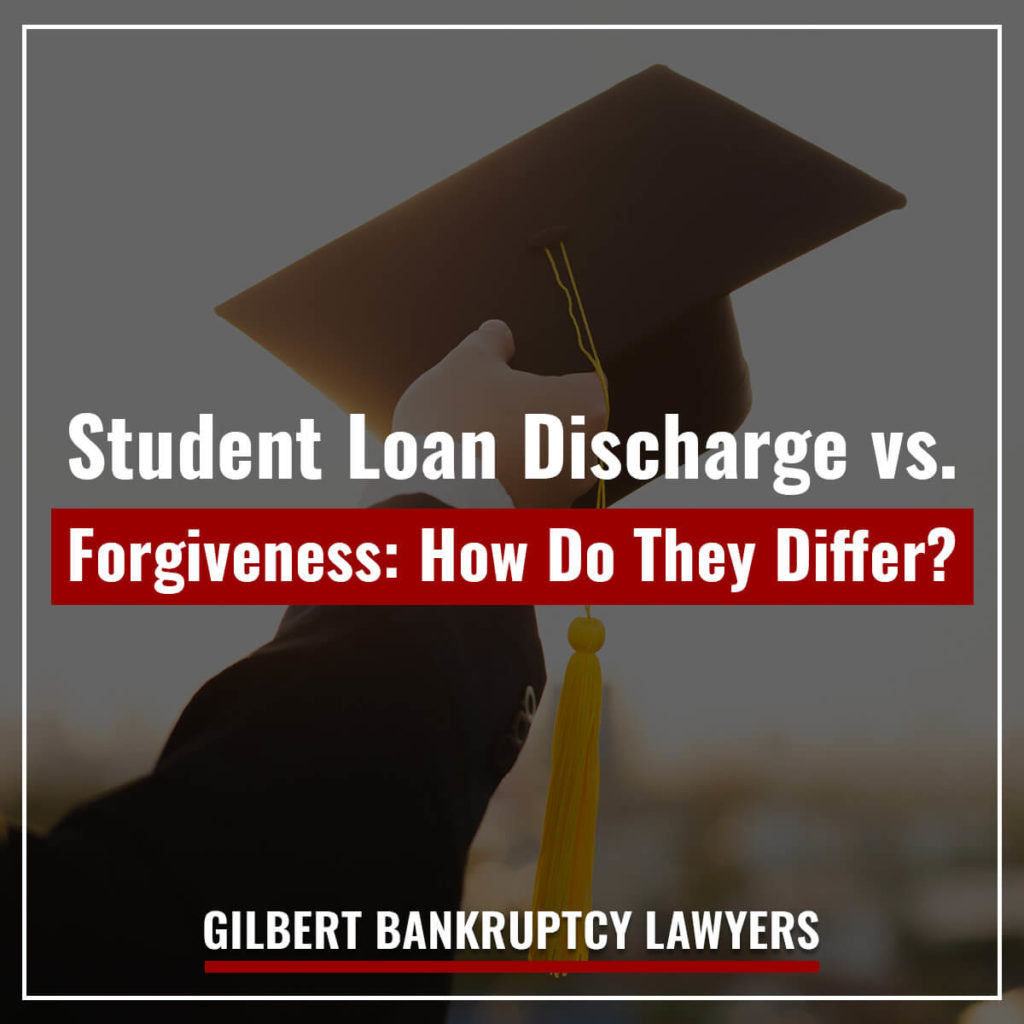Student Loan Discharge vs. Forgiveness: How Do They Differ?
Arizona Bankruptcy Attorneys Explain The Difference Between Loan Discharge & Forgiveness
Student loans remain some of the biggest debts for people across the country. Many people are carrying tens of thousands in debt after graduating, and some are even carrying hundreds of thousands. Even with great paying jobs after graduation, many people end up paying on these loans for decades.
But what happens if you run into financial trouble along the way? What happens if you lose your job, and you go months or even years without finding another one or without finding one that pays what you need? What happens if you become seriously ill or injured? What are your options for getting rid of that student loan?
As any bankruptcy attorney will tell you, there aren’t many options for getting rid of your student loans, but it’s not entirely impossible either. Here’s a look at what circumstances might lead to having your student loans discharged or forgiven:
Student Loan Forgiveness
Depending on what field you are working in, you may be able to have your student loans forgiven after a certain amount of time. The federal government sponsors two programs that forgive student loans for people working in certain professions.
Public Service Loan Forgiveness
Under this program, you can have your student loans forgiven if you have worked in a public service position for 10 years and you have made your student loan payments on time for the last 120 months (also 10 years). Professions in the public service sector can include police officer, firefighter, teacher, social worker, doctor, nurse, public interest attorney, and others.
Teacher Loan Forgiveness
Teachers have an additional option for having their student loans forgiven. Under this program, you can get some of your loans forgiven if you have worked at a teacher in a qualifying school – usually in an underserved area – for five years and have fulfilled other requirements. The program will forgive up to $17,500 in student debt.
Student loan forgiveness is not widely available, and it does not forgive all your debt. You will either get only a portion of the debt forgiven, or you will have to pay a significant portion of it before you qualify for loan forgiveness.
Student Loan Discharge
There are a number of scenarios in which the federal government will discharge your student loans, but none of them are easy. You may have your student loans discharged if:
You die. Hopefully, you can find debt relief through less extreme circumstances, however. But it may offer you comfort to know that at least your family won’t be saddled with your debt if you pass unexpectedly.
You are totally and permanently disabled. Again, hopefully, you won’t have to meet with such extreme circumstances to find debt relief. However, if you can no longer work because you are disabled, you may qualify to have your student loans discharged.
You are the victim of identity theft. If you can prove that someone used your name and personal details to open a student loan, you can have it discharged.
You have been fraudulently misled. You may be able to get your student loans discharged if you can prove that your educational institution misled you about the benefits of attending the school or your career eligibility after graduating. You can also claim fraudulent misrepresentation if the school did not notify you about reimbursement money owed to you or signed your name to a loan.
You may also be able to have your student loans discharged through bankruptcy. However, any bankruptcy attorney will tell you that it is extremely difficult to do so. Showing routine financial distress will typically not be enough because the government will just offer to defer your loans or to lower your payments to what you can afford. You will need to prove dire financial circumstances to discharge your student loans through bankruptcy.
But that doesn’t mean that bankruptcy can’t help. You can file for Chapter 7 bankruptcy to have most or all of your unsecured debt discharged, such as credit card or medical debt. Doing so would free up a lot of money each month to help you get a better financial handle on your student loans – maybe even paying extra on them to pay them off faster. You can also file for Chapter 13 bankruptcy to reorganize your debt under a more affordable repayment plan, and that can include your student loans. You may pay a lower interest rate and a lower monthly payment under your Chapter 13 repayment plan, which can help you get a better handle on your finances so that you can pay your student loans and other debts more easily when you emerge from bankruptcy protection.
Contact a Professional Bankruptcy Law Firm In Gilbert
Call Gilbert Bankruptcy Lawyers today to learn more about how bankruptcy might be able to help you with your student loans. A bankruptcy lawyer will review your financial details to determine if you may be able to get your student loans discharged under bankruptcy or if you can use bankruptcy to get other debt relief to better handle your student loan burden. We represent clients in both Chapter 7 bankruptcy and Chapter 13 bankruptcy. Our goal is to help relieve you of as much debt as possible. Call us today to schedule a consultation with an experienced bankruptcy lawyer and learn more about your options.
Gilbert Bankruptcy Lawyers
Office: 480-448-9800
Email: info@myazlawyers.com
Website: https://gilbertbankruptcylawyers.com

